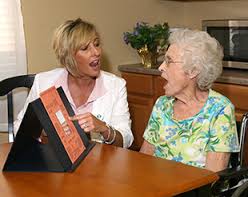Skilled Nursing Facilities
Skilled nursing facilities, also called SNF's (pronounced sniffs) provide nursing services that a nursing home cannot due to not having the license and staff to provide that level of care.
Some of the services that can be provided in a SNF include:

2. Physical Therapy provided by licensed physical therapist or by licensed physical therapy assistants (LPTA's) under the supervision of a physical therapist.

3. Occupational therapy provided by a licensed occupational therapist or an occupational therapy assistant under the supervision of the licensed occupational therapist.

4. Speech therapy provided by a licensed speech and language pathology therapist.

How to Pay for Skilled Nursing Facility care
Medicare will pay for care provided in a skilled nursing facility under certain circumstances and only for a certain time period. Here are the criteria that apply for admission to a nursing home under Medicare.
- You must have had a 3 day or longer stay in the hospital to qualify for Medicare admission.
- The facility you are considering must be a licensed SNF participating in the Medicare program. Not all nursing facilities are Medicare certified.
- You must be admitted to the nursing facility within 30 days of discharge from the hospital.
- Your admission to the facility must be for the same reason you were hospitalized. For example, you suffered a stroke and were hospitalized for 7 days. You are now being admitted to a nursing facility for rehabilitation related to the stroke.
- Your physician will have to prescribe daily rehabilitation to be provided by a registered nurse and/or a licensed therapist.
- Medicare covers 100% of all costs related to your rehabilitation for up to 20 days.
- From day 20 to day 100, you will have a co-pay for which you'll be responsible. You can ask the nursing facility administration what that copay will be as it may change from one year to the next. Medicare usually increases that amount every January.
- Medicaid may pay your co-pay if you qualify for Medicaid. If you have a Medicare supplemental plan, it will probably pay for your co-pay. You should talk to your supplemental program agent to get accurate information. You should talk to the nursing facility admissions office to get a clear understanding of all charges before admission.
- After day 100, you are responsible for paying 100% of the cost of care unless you also qualify for Medicaid.
- You must also be able to show improvement during your rehabilitation. Once you have peaked or plateaued in your rehabilitation, Medicare can no longer continue your coverage.
- When your rehabilitation is complete, you may then be discharged to a your home or to an assisted living facility or you may stay in the same facility where your rehab was provided but under a different payment method and probably in the nursing home.
Thank you for visiting, Guide to Elder Care.